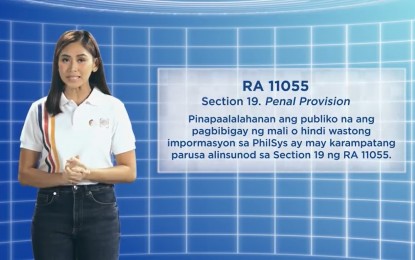
(Screengrab from PSA video)
MANILA – Refusal to accept, acknowledge and/or recognize Philippine Identification (PhilID) or national ID is punishable by the law.
In a statement Wednesday, the Philippine Statistics Authority (PSA) said the penal provision of Section 19 of Republic Act 11055 states that "any person or entity who without just and sufficient cause, shall refuse to accept, acknowledge and/or recognize the PhilID or PSN, subject to authentication, as the only official identification of the holder/possessor" will be fined amounting to PHP500,000.
Those who will unlawfully use the PhilID or PSN (PhilSys Number) will be punished with imprisonment of "not less than six months but more than two years" or will be fined amounting to at least PHP50,000 or up to PHP500,000 or both, at the discretion of the court.
If the offender is found guilty of submitting false information during the application, renewal, or updating PhilSys information will be penalized with 3 to 6 years of imprisonment and a fine of PHP1 million to PHP3 million.
A similar penalty will be given to those who will conduct unauthorized printing, preparation, and issuance of PhilID cards including willful falsification, mutilation, alteration, or tampering of the PhilID cards.
Those people who will unlawfully "disclose, collect, record, convey, disseminate, publish or use" any information of PhilSys registrants without any authority will be penalized with 6 to 10 years of imprisonment and will be fined amounting to PHP3 to PHP5 million.
"If financial profit resulted from accessing, disclosing, or using the data or information, the guilty person shall, in addition, pay twice the amount gained from such act," according to the law.
Individuals who have official custody or responsibility for maintaining the PhilSys, including registry employees and agents, are prohibited to disclose any PhilSys data, including registrants' information.
Offenders of this provision will be penalized with 10 to 15 years imprisonment and will be fined amounting to PHP5 million to PHP10 million.
The penalty will also be imposed if unauthorized access to PhilSys will be made through the own negligence of officials, employees, or agents. Offenders will be penalized with 3 to 6 years of imprisonment and a fine of PHP1 to PHP3 million.
If the violation was committed by a government official or employee, in all instances, the penalty will include "perpetual absolute disqualification from holding any public office or employment" in the government, including any GOCCs, and their subsidiaries.
The PhilID can be acquired by completing the three steps of the registration under the Philippine Identification System (PhilSys) project.
The collection of demographic information such as full name, gender, date, and place of birth, blood type, and address, will be done in Step 1 by signing up for free via https://register.philsys.gov.ph.
Step 2 registration process involves the validation of supporting documents and the capture of biometric information.
It will be followed by the delivery of PhilSys Number (PSN) and PhilID card to the owner’s home address in Step 3.
The PhilID and PSN, issued to the PhilSys registrants, are both non-transferrable.
Signed into law by President Rodrigo Duterte in August 2018, Republic Act 11055, or the Philippine Identification System Act, aims to establish a single national ID for all Filipinos and resident aliens.
The national ID shall be a valid proof of identity that shall be a means of simplifying public and private transactions, enrolment in schools, and the opening of bank accounts.
It will also boost efficiency, especially in dealing with government services where people will only need to present the PhilID during transactions. (PNA)
